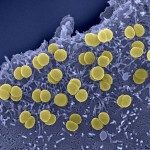Lien vers Pubmed [PMID] – 26597036
Lien DOI – 10.1016/j.vaccine.2015.10.055S0264-410X(15)01470-X
Vaccine 2015 Nov; 33(48): 6529-36
The Global Meningococcal Initiative (GMI) was established in 2009 and comprises an international team of scientists, clinicians, and public health officials with expertise in meningococcal disease (MD). Its primary goal is to promote global prevention of MD through education, research, international cooperation, and developing recommendations that include decreasing the burden of severe disease. The group held its first roundtable meeting with experts from Latin American countries in 2011, and subsequently proposed several recommendations to reduce the regional burden of MD. A second roundtable meeting was convened with Latin American representatives in June 2013 to reassess MD epidemiology, vaccination strategies, and unmet needs in the region, as well as to update the earlier recommendations. Special emphasis was placed on the emergence and spread of serogroup W disease in Argentina and Chile, and the control measures put in place in Chile were a particular focus of discussions. The impact of routine meningococcal vaccination programs, notably in Brazil, was also evaluated. There have been considerable improvements in MD surveillance systems and diagnostic techniques in some countries (e.g., Brazil and Chile), but the lack of adequate infrastructure, trained personnel, and equipment/reagents remains a major barrier to progress in resource-poor countries. The Pan American Health Organization’s Revolving Fund is likely to play an important role in improving access to meningococcal vaccines in Latin America. Additional innovative approaches are needed to redress the imbalance in expertise and resources between countries, and thereby improve the control of MD. In Latin America, the GMI recommends establishment of a detailed and comprehensive national/regional surveillance system, standardization of laboratory procedures, adoption of a uniform MD case definition, maintaining laboratory-based surveillance, replacement of polysaccharide vaccines with conjugate formulations (wherever possible), monitoring and evaluating implemented vaccination strategies, conducting cost-effectiveness studies, and developing specific recommendations for vaccination of high-risk groups.

